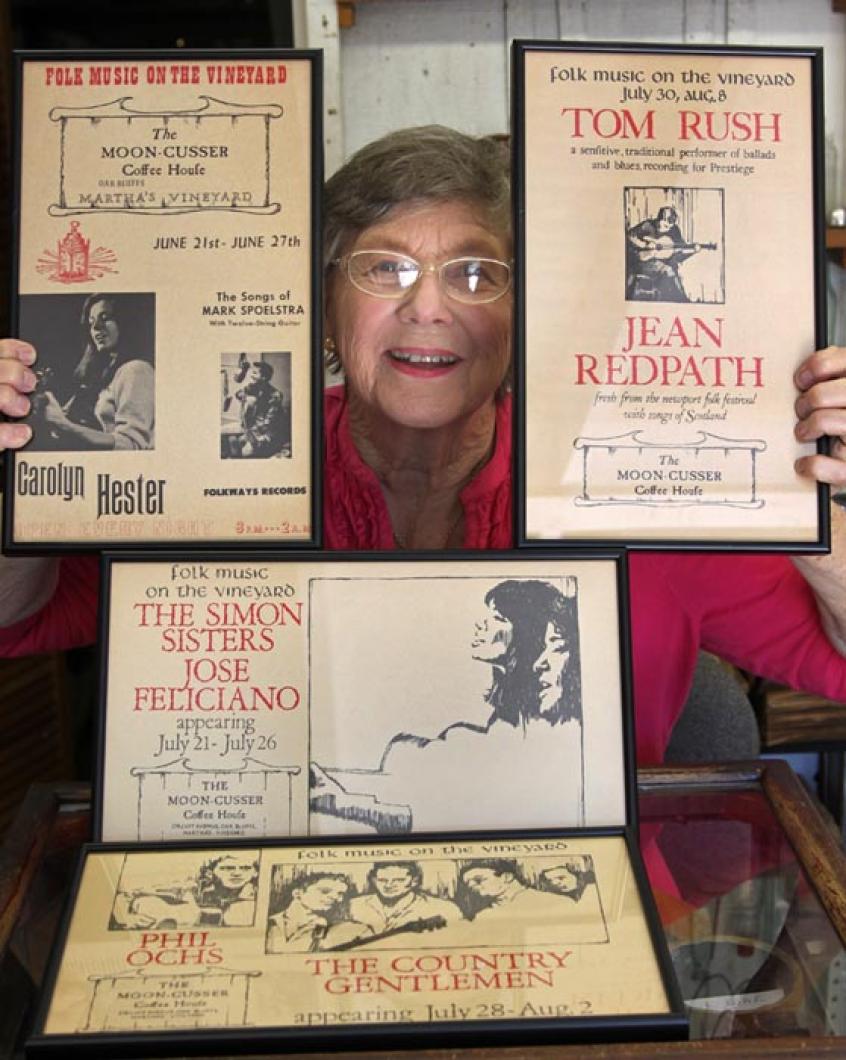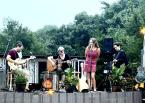In the summer of 1963, America was on the brink of being split apart by the tumult of the Viet Nam War, the Civil Rights movement and Bob Dylan going electric.
The folk music revival was in full swing and was making a big impact in the popular culture. Martha’s Vineyard got caught up in the folk music movement that summer when David Lyman, the manager of a coffeehouse in Boston, and Philip Metcalf, a college student with a car and knowledge of the Vineyard, opened a coffeehouse called the Moon-Cusser.
The Moon-Cusser will be remembered this week when 17 of the original posters of the musical acts from that time will be for sale at Over South, an antique shop owned by Jane Slater in Menemsha.
Coffeehouses were an integral part of the emerging folk music scene in the 1960s. David Lyman had the idea to start one on the Vineyard after visiting the Island with a friend. He was running a coffeehouse in Boston called The Unicorn at the time, but liked the idea of getting out of Boston for the summer. So he found two financial backers, Fritz Dworshak and Dick Randlett, to put up the money for the business. He found a store that was being vacated on Circuit avenue in Oak Bluffs, which they rented. Basics clothing store occupies the location now.
The aesthetic of the place was intentionally rustic. “I found a barn out in Wellesley that was falling down and I told the owner that I would tear it down for him,” said Mr. Lyman. “So we did that and brought the barn board down to the Vineyard to use as decor. So the decor was barn board and burlap. We built a small stage, enough to hold a trio, and a PA system and a lighting system, put in a kitchen out in back, found tables and chairs at various restaurants and supply places in Boston, just threw everything in a big rental truck and drove down to Woods Hole, came across on the ferry, dumped all the stuff, took the truck back, and built the place in about a week.”
The name harks back to colonial times when people would hang lights on the shore to try to make ships run aground thinking they were harbor markers, so the people could loot the spoils of the wreck. The thieves would cuss the full moon which spoiled their scheme.
The opening night of the Moon-Cusser was a wild success. For talent, Mr. Lyman brought in Carolyn Hester and Mark Spoelstra, and the Charles River Valley Boys, all well-known folk music acts at the time. From there the summer grew into a powerful sequence of performances. A 15-year-old named James Taylor attracted some attention at the Monday night hootenannies. Two sisters named Carly and Lucy Simon played their first gig there.
“The most interesting nights were Monday night hootenanny which in folk music is sort of open mike night,” said Phil Metcalf, who was the assistant manager that summer. “The way the Moon-Cusser was set up, when you came in the front door there was barn board paneling with some signs and you took a sharp left and you faced me at the cash register to pay for the cover. And it had been built so that the sound and light controls were set down right next to the cash register. On Monday night for the hootenannies, it was so popular, there would be so many people there that I never could see the stage and I used to control the lights by looking at the reflection in the ceiling. It was absolutely packed.”
In addition to James Taylor and the Simon sisters there was The New Group, with Dave Gude, Tom West and Pam Goff.
Throughout the summer, well-known folk acts were brought into the coffeehouse to perform, including Bud and Travis, Ramblin’ Jack Elliot, Ian and Sylvia, Jean Redpath, Tom Rush, The Country Gentlemen, Bonnie Dobson, Don Paulin, Jessie Benton, David Gude, the Charles River Valley Boys and Doc Watson.
In a telephone interview this week from her home in Vineyard Haven, Carly Simon recalled the summer fondly.
“It was thrilling. It was absolutely thrilling. It was the biggest thing that had ever happened to me,” said Ms. Simon, who turned 18 that summer. “It made me inspired to do so much. It obviously had a profound effect on me because I somehow saw it in my mind that I would be singing with a man and that it would be very Vineyard based, and when you picture something, when you visualize something, it very often comes to be. And so I felt very much when I met James Taylor that it was like Jessie [Benton] and David [Gude] and as it turned out Davie had taught James some guitar chords too, just in the way he taught Lucy and me.”
All who remembered said there an element of clean fun about the place.
“What sort of made it special? I think that one of the things . . . was just that everyone had so much fun,” said Mr. Metcalf. “Because this was sort of an innocent age, there was nothing like it on the Vineyard when it opened, there was no other comparable facility that was offering good live music, a good cup of coffee, good pastries. The pastries were all handmade by a woman who lived further down Circuit avenue. We’d go up and say, I need two apple pies and a cherry pie, and she would make them and walk up Circuit avenue and deliver them.”
There were many stories about that summer, long before the age of Internet and cell phones. When the sun went down, music at the coffeehouse was a main attraction. And the posters that will be sold starting today at Mrs. Slater’s antique shop in Menemsha are a story of how publicity used to work.
“One of the girls that came on board to be one of the waitresses for the summer, I can’t remember her name, but she was a student at Rhode Island School of Design, and she knew a guy, a guy that was really good, you know, as a designer and drawer,” said Mr. Lyman. “And he came and I paid him some money to draw the posters and he hand-lettered them and hand-drew them. I gave him eight-by-ten photographs of the groups and he would then do the sketches, the hand-drawn sketches, and made them look like they were woodcuts. So he would give us those. Every couple of weeks he would do a batch of them and we’d get them printed there on the Island on what was known as recycled paper so it had a real antiquey look and then Phillip and I, on Mondays I think, we would jump in his yellow Jeepster and we’d just take a tour around the entire Island and we’d stick these posters up all over the place. So that was our major way of marketing.”
The story of how the posters made their way back to Menemsha? Mr. Metcalf had sold his parents house on the Vineyard and moved to Santa Fe, N.M., several years ago. When he decided to sell the old posters, he knew just to whom to talk.
“He knew I was an antique dealer. I mean, I had been in touch with him, not about that, but other antique matters when he still lived here on the Island,” said Mrs. Slater.
The Moon-Cusser lasted for three seasons although the management and ownership changed each year. David Lyman left after the first year, as did owner Fritz Dworshak. Phillip Metcalf stayed one more season, but said it was not the same, particularly since a second coffee house opened in Oak Bluffs and the folk music audience spread out.
But that first year seems to be universally burned into the memories of those who were there. It was a glorious time for folk music. And then Dylan went electric.
The show and sale of Moon-Cusser posters takes place beginning tomorrow at Over South Antiques on Basin Road in Menemsha. The store hours are 10 a.m. to 5 p.m. The telephone number is 508-645-3378







Comments (2)
Comments
Comment policy »